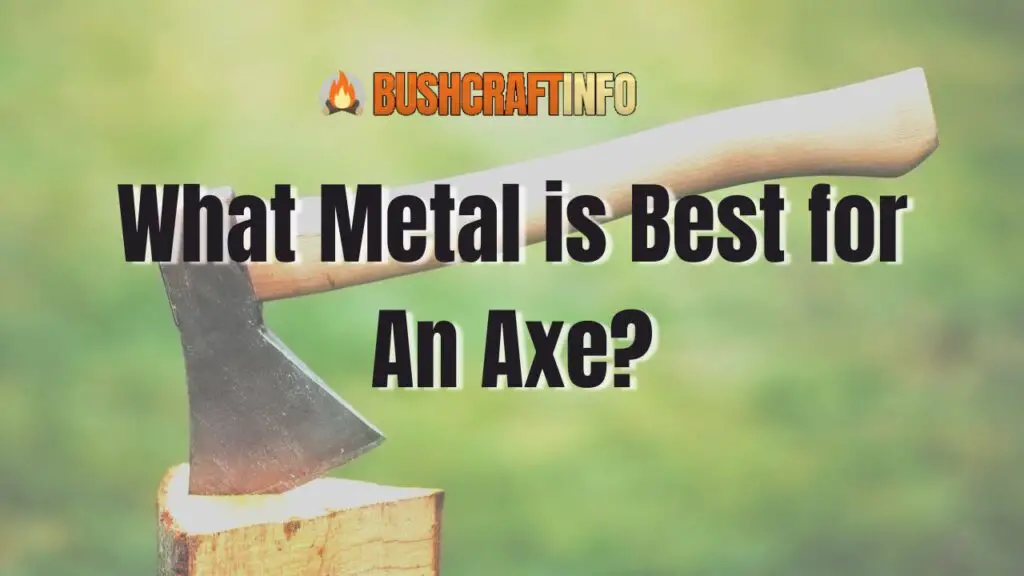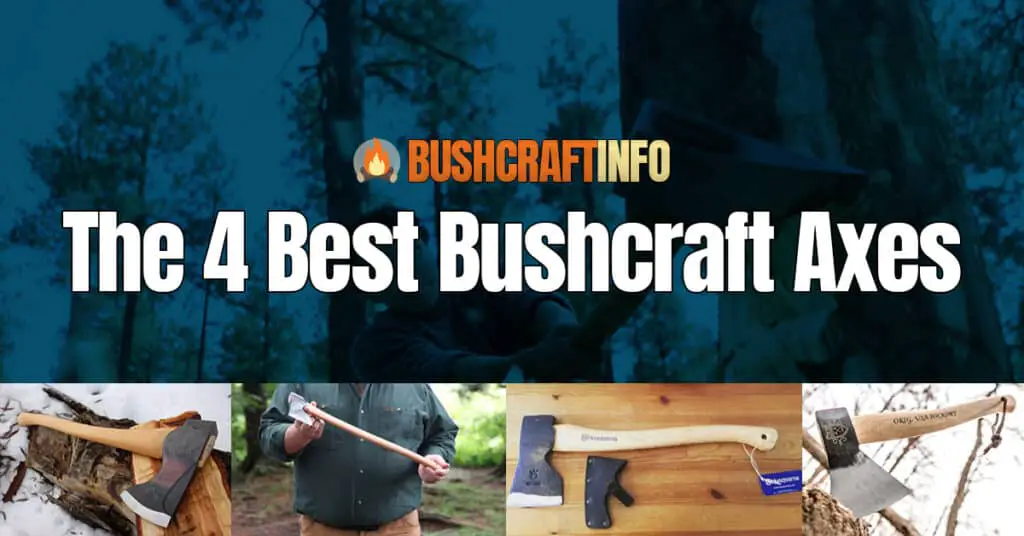If you are going to choose an axe for your next adventure, you might be wondering “what metal is best for an axe?”
The best metal for an axe is mid-carbon steel such as 1050 or 1060. It provides a good balance of strength and durability without being too brittle or too soft. In addition, it is easy to forge and sharpen plus it retains its edge.
However, there are different types of metals used for forging knives, axes, and hatchets. All of them have different properties, which make them more or less suitable for a certain task.
In this article, we will take a look at different types of metals in order to learn what metal is best for an axe. So without any further ado, let’s get started!

What Metal is Best for An Axe: A Deeper Look
As mentioned earlier, mid-carbon-based steel is one of the best metals you can use for an axe. However, there are different types of steel and all of them have different properties.
In order to choose the best metal for your axe, you need to know what those properties are and how they affect the quality of your axe.
Let’s take a look at some of the most important properties of steel:
Hardness:
This is a measure of how much force is required to deform the metal. A harder metal will be more resistant to wear and tear but will also be more brittle.
Toughness:
This is a measure of how much energy the metal can absorb before it fractures. A tougher metal will be more resistant to impact but will also be more likely to deform.
Ductility:
This is a measure of how much the metal can be deformed before it fractures. A more ductile metal will be more resistant to impact but will also be more likely to deform.
Strength:
This is a measure of how much force the metal can resist before it fractures. A stronger metal will be more resistant to wear and tear but will also be more brittle.
Corrosion resistance:
This is a measure of how well the metal resists corrosion. A more corrosion-resistant metal will be more resistant to rust but will also be more expensive.
Now that we know the most important properties of steel, let’s take a look at some of the different types of steel and how they compare.
| Type of steel | Hardness | Toughness | Ductility | Strength | Corrosion resistance |
|---|---|---|---|---|---|
| 1050 steel | Medium | High | High | Medium | Good |
| 1060 steel | Medium | High | High | Medium | Good |
| 4140 steel | Hard | Medium | Low | High | Poor |
| 5160 steel | Hard | Medium | Low | High | Poor |
As you can see, 1050 and 1060 steel are both good choices for an axe. They have a good balance of hardness, toughness, and strength. In addition, they are both highly corrosion-resistant.
Different Types of Metals Used for Axes
There are different types of metals used to make axes, each with its own set of properties. The most common metals used are:
- Carbon steel: This is the most common type of steel used for axes. It is carbon-based steel, which means it has a good balance of hardness, strength, and durability.
- Tool steel: This is a type of steel that is designed to be hard and durable. It is often used for cutting tools such as axes and knives.
- Stainless steel: This is a type of steel that is designed to resist corrosion. It is often used in food preparation and medical instruments.
- Cast iron: This is a type of iron that is cast into shape. It is often used for cookware and ornamental objects.
Now that we know the different types of metals used for axes, let’s take a look at how they compare.
| Type of metal | Hardness | Toughness | Ductility | Strength | Corrosion resistance |
| Carbon steel | Medium | High | High | Medium | Good |
| Tool steel | Hard | Medium | Low | High | Poor |
| Stainless steel | Medium | High | High | Medium | Good |
| Cast iron | Hard | Medium | Low | High | Poor |
As you can see, carbon steel and stainless steel are both good choices for an axe. They have a good balance of hardness, toughness, and strength. In addition, they are both highly corrosion-resistant.
Is 1095 Steel Good For Axes?
You might be wondering whether the 1095 steel is a good choice for an axe. The answer is yes, 1095 steel is a good choice for an axe. It is high-carbon steel which means it has a higher hardness and strength. In addition, it is highly corrosion-resistant.
However, it may not be able to hold its edge as much as other types of steel. Apart from that, it is also slightly difficult to sharpen as compared to the 1050 and 1060. In my opinion, these are the best options so far.
How To Choose The Right Type Of Metal For An Axe
The type of metal you choose for your axe is important. You need to consider the different properties of each type of metal and how they will affect the performance of your axe.
In general, you want to choose a metal that is hard, tough, and strong. In addition, you want to choose a metal that is resistant to wear and tear.
The most important factor to consider is the hardness of the metal. The harder the metal, the more resistant it will be to wear and tear. However, you also need to consider the toughness of the metal.
The tougher the metal, the more resistant it will be to impact. However, a tough metal can also be more likely to break.
You also need to consider the strength of the metal. The stronger the metal, the more resistant it will be to breaking. However, a strong metal can also be more difficult to work with.
Is Damascus Steel Good For Axes?
Damascus steel looks fabulous, but is it the right type of steel for axes? The answer to this question is yes.
Damascus steel is a good choice for an axe. It is high-carbon steel, meaning it has a higher hardness and strength. Damascus steel can also be treated with heat to make it even harder.
However, it may not be able to hold its edge as much as other types of steel. That’s the only problem with Damascus steel.
What Is The Best Metal For An Axe?
The best metal for an axe depends on your needs and preferences. If you need an axe that is tough and durable, then choose tool steel.
If you need an axe that is easy to sharpen and has good edge retention, then choose carbon steel. If you need an axe that is resistant to corrosion, then choose stainless steel.
In my opinion, the best metal for an axe is the one that fits your needs and preferences the most.
Should An Axe Be Shaving Sharp?
Another question that most people ask is whether an axe should be shaving sharp. The answer to this question is no, an axe does not need to be shaving sharp.
An axe is a tool that is designed for chopping, not shaving. As long as the edge of the axe is sharp enough to chop wood, it doesn’t need to be any sharper.
In addition, a shaving-sharp edge can be more prone to chipping and breaking. So, it is not necessary to make your axe shaving sharp. You should always go for a tough and durable axe head instead of a razor-sharp edge.
You can choose a cleaver or something for tasks that require a sharp edge as it will fulfill the needs and requirements easily.
What Makes A Quality Axe?
The answer to this question may vary depending on who you ask, but there are definitely some key factors that go into making a high-quality axe.
First and foremost, the head of the axe needs to be made from a tough and durable material that can withstand repeated blows without chipping or breaking.
Additionally, the head should be properly shaped and sharpened so that it can efficiently chop through wood.
Finally, the handle of the axe needs to be made from a sturdy material such as wood or metal. Also, it should be comfortable to grip so that you can use it for long periods of time without fatigue.
You should also keep the situation in mind while choosing an axe. For example, if you are looking for one that can help you in outdoors and bushcraft scenarios then it should be lightweight.
If you keep these factors in mind, you should be able to find a quality axe that will serve you well for many years to come.
Final Words
So what metal is best for an axe? Generally, mild carbon steel is usually considered the best metal for axes and hatchets. It is because this kind of metal is very easy to forge and sharpen.
Besides that, it provides a good balance of strength and durability and retains its edge for a longer duration. If you are looking for an ax that is beautiful as well as functional, then Damascus steel would be the best choice.
I hope after reading this article, you will be able to choose the best metal for your axe according to your needs and preferences.
Thanks for reading!
Was this post helpful?

Hey I’m Josh! I have been practicing Bushcraft for a little over 6 years now! I Started this website to review awesome bushcraft gear that I love as well as share information I have learned along the way!


